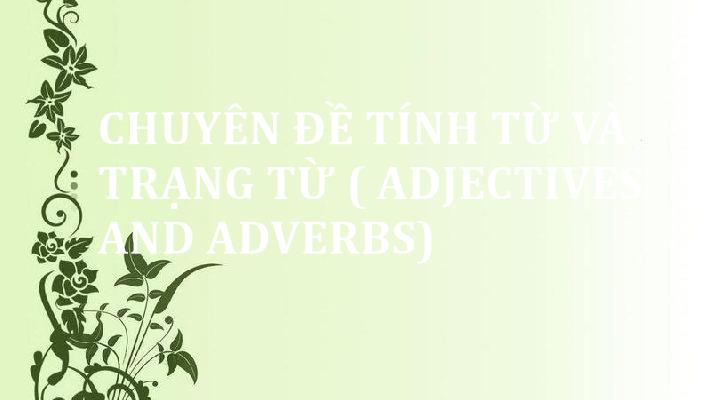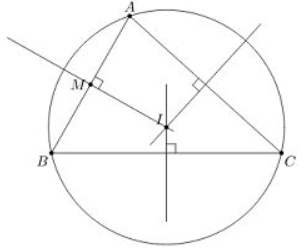CÁC LOẠI ĐỘNG TỪ
(Biên soạn : Bùi Tuấn An)
I. NỘI ĐỘNG TỪ - NGOẠI ĐỘNG TỪ
1. Nội động từ (intransitive verbs)
- · Nội động từ diễn tả hành động nội tại của người nói hay người thực hiện hành động.
Ví dụ: - He walks.
- Birds fly.
- · Nội động từ không cần có tân ngữ trực tiếp đi kèm. Nếu có thì phải có giới từ đi trước và cụm từ
này sẽ đóng vai trò ngữ trạng từ chứ không phải là tân ngữ trực tiếp.
Ví dụ: - She walks in the garden.
- Birds fly in the sky.
2. Ngoại động từ (transitive verbs)
- · Ngoại động từ diễn tả hành động gây ra trực tiếp lên người hoặc vật.
Ví dụ: The cat killed the mouse.
- · Ngoại động từ luôn cần thêm yếu tố bên ngoài là một danh từ hay đại từ theo sau để hoàn thành
nghĩa của câu. Danh (đại) từ đi theo sau ngoại động từ là tân ngữ trực tiếp.
NOTE
Sự phân chia nội động từ và ngoại động từ chỉ là tương đối, vì trong câu này, động từ ấy là nội động từ
nhưng trong câu khác nó lại là ngoại động từ.
- · The boy broke the glass. (Cậu bé làm vỡ cốc) - ngoại động từ
- · The bus stopped. (Chiếc xe buýt dừng lại) - nội động từ
- · The driver stopped the bus. (Tài xế dừng xe buýt lại) - ngoại động từ
- · The bell rings. (Chuông kêu) - nội động từ
- · He rings the bells. (Ông ấy rung chuông) - ngoại động từ
- The glass broke ( cốc vỡ)- nội động từ
Write whether each sentence contains a transitive or intransitive verb.
1. We laughed.
2. He opened the door.
3. She crossed the street.
4. We drove to San Francisco.
5. They talked.
6. He rang the doorbell.
7. I called my mother.
8. You learned Spanish.
9. She made spaghetti.
10. You slept for three hours.
II. ĐỘNG TỪ CÓ QUY TẮC - ĐỘNG TỪ BẤT QUY TẮC
1. Động từ có quy tắc
Động từ có quy tắc (Regular verbs) là động từ có hình thức quá khứ đơn (simple past) và quá khứ phân từ
(past participle) được thành lập bằng cách thêm -ed vào động từ nguyên mẫu (infinitive).
Ex:
work worked worked
invite invited invited
study studied studied
2. Động từ bất quy tắc
Động từ bất quy tắc ( rregular verbs) là động từ có hình thức quá khứ đơn (simple past) và quá khứ phân từ
(past participle) được thành lập không theo quy tắc nhất định nào.
Ex:
Be was/were been
see saw seen
teach taught taught
Put in the missing forms of the verbs.
1. go → _____→ _____
2. do → _____ → _____
3. walk → _____ → _____
4. play → _____ → _____
5. see → _____ → _____
6. come → _____ → _____
7. have → _____ → _____
8. mix → _____ → _____
9. read → _____ → _____
10. write→ _____ → _____
III. TRỢ ĐỘNG TỪ
1. Giới thiệu chung về trợ động từ
- · Dùng để bổ nghĩa thêm cho động từ chính về tính chất, mức độ, khả năng, hình thái, ... của hành
động.
- · Không thay thế được cho động từ chính (phải luôn có động từ chính đi kèm)
· Do
Ex: Does Sam write all his own reports?
- · Have
Ex: The secretaries haven’t written the letters yet.
- · Be
Ex: Terry is writing an e-mail to a client at present.
Động Từ Khuyết Thiếu
Can - Could
May - Might
Must - Shall
Ought to - Should
Will - Would
Trợ động từ đặc biệt
Need - Dare
Have to - Used to
- You needn’t/don’t need to go now.
- · Have you to/Do you have to hand it in tomorrow?
- · Dare you/Do you dare to hit me?
- · I used not to/didn’t use to wake up late.
2. Chức năng của trợ động từ
2.1. Hình thành thể phủ định bằng cách thêm NOT sau trợ động từ.
do – do not – don’t
does – does not – doesn’t
did – did not – didn’t
is – is not – isn’t
am – am not – amn’t
are – are not – aren’t
have – have not – haven’t
has – has not – hasn’t
had – had not – hadn’t
can – cannot – can’t
could – could not – couldn’t
may – may not
might – might not
must - mustn’t
shall – shall not – shan’t
should – should not – shouldn’t
ought to – ought not to – oughtn’t to
will – will not – won’t
would – would not – wouldn’t
need – needn’t
dare – dare not (to)
have to – don’t have to – haven’t got to
used to – didn’t use to – used not to
Ví dụ:
I have finished my homework.
⟶ have not (haven’t) finished my homework.
They will help us.
⟶ They will not (won’t) help us.
2.2. Hình thành thể nghi vấn bằng đảo ngữ.
She is cleaning the floor.
⟶ Is she cleaning the floor?
He cooked my breakfast.
⟶ Did he cook my breakfast?
|
|
Quá khứ đơn |
Hiện tại đơn |
Tương lai đơn |
|
+ |
did |
Do/ does |
will |
|
- |
didn’t |
Don’t/ doesn’t |
won’t |
|
? |
Did S V? |
Do/does S V? |
Will S V? |
|
|
QKTD |
HTTD |
TLTD |
|
+ |
was were |
Am/is are |
Will be |
|
- |
was not were not |
Am not/is not are not |
won’t be |
|
? |
Was/Were S V-ing? |
Am/is/are S V-ing? |
Will S be V-ing? |
|
|
QKHT |
HTHT |
TLHT |
|
+ |
had |
have/has |
will have |
|
- |
hadn’t |
have/has not |
won‘t have |
|
? |
Had S Vpp? |
Have/has S Vpp? |
Will S have Vpp? |
|
|
QKHTD |
HTHTTD |
TLHTTD |
|
+ |
had been |
have/has been |
will have been |
|
- |
hadn‘t been |
have/has not been |
won’t have been |
|
? |
Had S been V-ing? |
Have/has S been V-ing? |
Will S have been V-ing? |
2.3. Hình thành câu hỏi đuôi.
- · Marry doesn’t love eter, does she?
- · Jonny has eaten sugar, hasn’t he?
2.4. Hình thành câu trả lời ngắn.
- · Does it take long hours to travel from here to your house?
Yes, it does.
No, it doesn’t.
- · Mary doesn’t like fish, neither does Fred.
- · Ms. Phuong works as a teacher.
So do I.
2.5. Được dùng lại trong loại câu tỉnh lược.
- · You will spend your holidays in Spain. Will you? (= Will you spend your holiday in Spain?)
- · You are dating with that guy. Are you? (= Are you dating with that guy?)
IV. ĐỘNG TỪ CHÍNH & TRỢ ĐỘNG TỪ
- · Do ⟶ trợ động từ
What do you want?
- · Do ⟶ động từ chính
I always do my homework in the evening.
- · What do you usually do in the evening?
(trợ động từ) (động từ chính)
- · Have/has Vpp or have/has been V-ing ⟶ trợ động từ
He has finished the report.
- · Have/has ⟶ động từ chính
He has no job.
- · To be ⟶ trợ động từ
I am reading a newspaper.
- · To be ⟶ động từ chính
I am hungry.
V. LUYỆN TẬP
Exercise 1. Is the verb in bold an auxiliary or a full verb?
• I am hungry.
• They do help you.
• y friend my does a lot of sports.
• ow much is it?
• I am reading an interesting book at the moment.
• She does the gardening every morning.
• She has never been to London.
• Does he speak English?
• They have a cat and a dog.
Exercise 2. Fill in the blank with the correct auxiliary verb from the choices presented.
1. What ________________ the kids doing when you last saw them? (was, were, are, did, been)
2. Carla ________________ always wanted to try skydiving. (was, doesn’t, has, is, have)
3. Where __________________ you go on your summer vacation? (were, been, are, did, does)
4. Why do you think she __________ call you like she said she would? (didn’t, is, hasn’t, has
been, have)
5. Mary _____________ going to be upset when she hears what happened. (will, don’t, is,
didn’t, has)
6. Jeremy _____________ want to go to the movies; he wants to stay home instead. (doesn’t,
isn’t, wasn’t, hasn’t, was not)
7. _________________ appreciate his jokes. They weren’t funny. (did, have, been, didn’t,
haven’t)
8. I really like fish but I _______________ care for meat. (weren’t, been, don’t, is, was)
9. Where _____________ you going when I saw you last night? (were, was, is, do, did)
10. Tara ________________ called yet; she’s late as usual. (are, were, has, hasn’t, wouldn’t)







